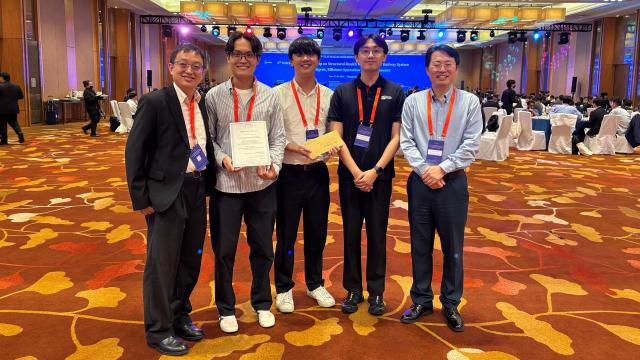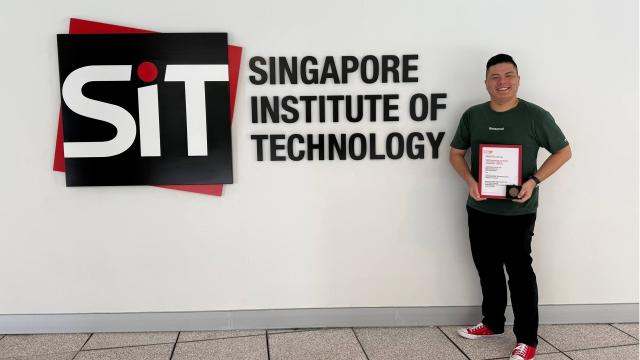Two teams from SIT, Bus-Tastic Daddies and WireBenders, won first and third prizes respectively in the student category of the annual competition organised by the Singapore Bus Academy and NTUC’s e2i.
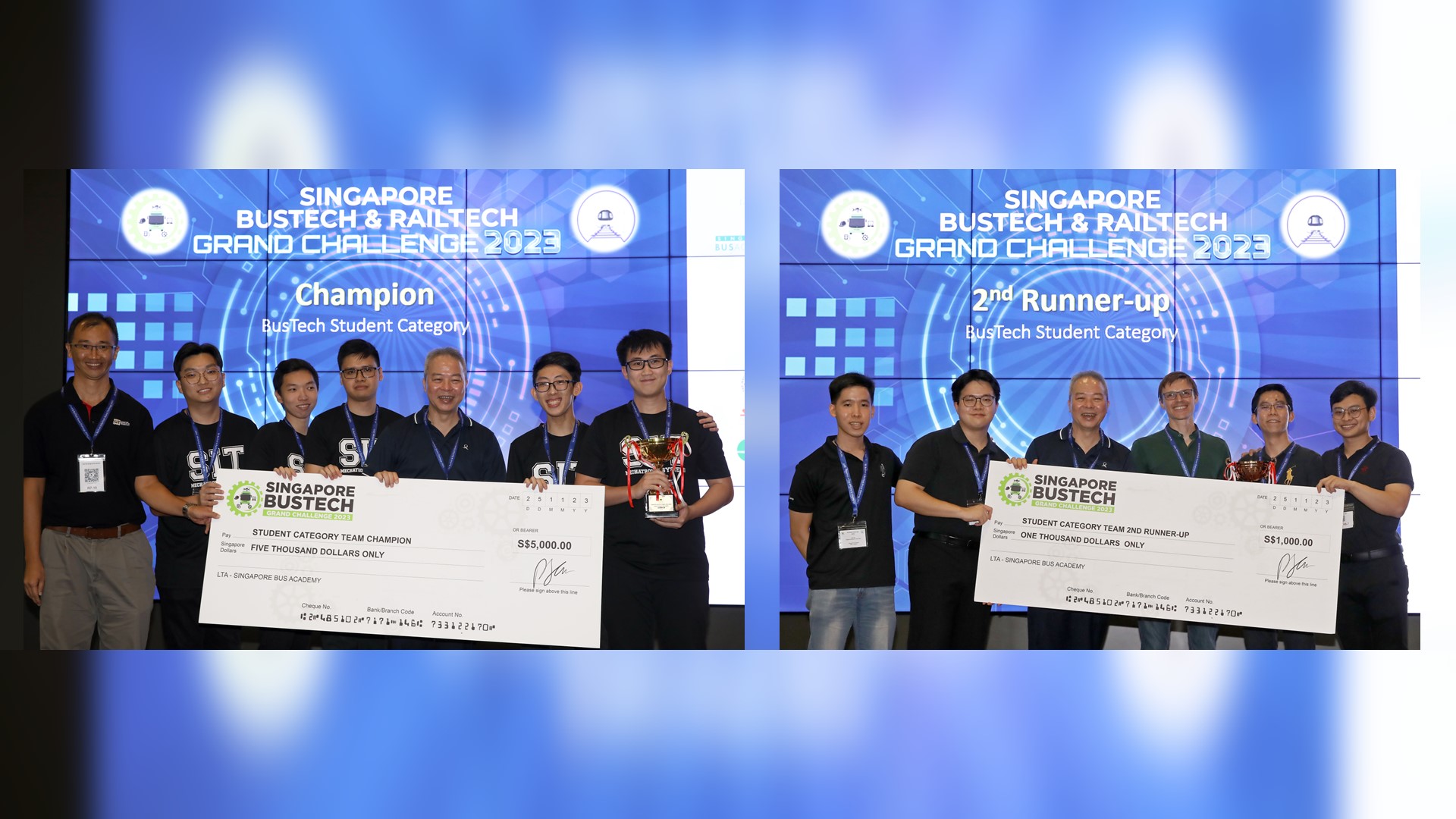
Team Bus-Tastic Daddies (left) and Team Wirebenders (right) clinched podium spots at the Singapore BusTech Grand Challenge 2023. (Photo: LTA)
They love a good challenge, so why not? Two teams from SIT, comprising students from the Mechatronics Systems programme and Computer Engineering programme, signed up for the Singapore BusTech Grand Challenge 2023 to acquire new skills while solving real-world problems.
The competition, now in its third year, was organised by the Land Transport Authority’s (LTA) Singapore Bus Academy and NTUC’s Employment and Employability Institute (e2i). This year’s focus was developing a battery management system (BMS) to help public bus operators monitor and control the performance, lifespan and safety of battery packs used in electric vehicles. The challenge is in the spirit of LTA’s EV Vision of greening Singapore’s public transport by 2030.
Participants were given a seed budget and six months to design and build their prototypes, before presenting them to Guest-of-Honour Mr Chee Hong Tat, Acting Minister for Transport, and the panel of judges on 25 November 2023 at ITE College West.
Never Try, Never Know… and Don’t Give Up!
Bus-Tastic Daddies, made up of Mechatronic Systems students Winardi Along, Wan Muhammad Syahmi Bin Wan Azmi, Daniel Ng Jun Shen, Peh Jun Wei and Lim Ee Han Ian, clinched the first prize and walked away with $5,000.
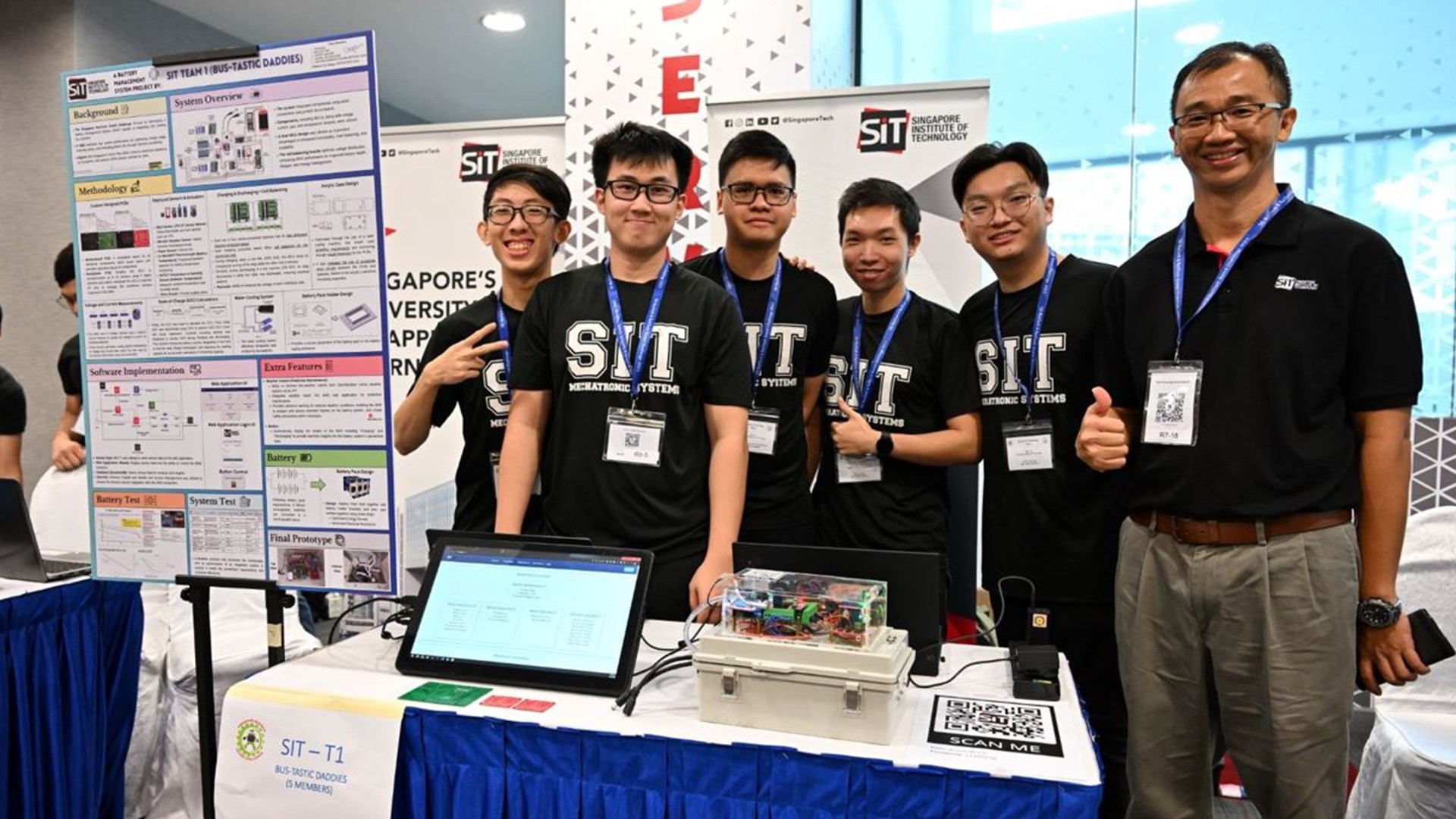
(From left to right:) Daniel Ng, Winardi, Muhammad Syahmi, Jun Wei, Ian Lim, and Associate Professor Paw Yew Chai. (Photo: LTA)
The judges were impressed by their original and creative prototype, which had the “most comprehensive” design that featured a multi-level control system, multiple sensors and a water-cooling system. The sensors can measure temperature and humidity, and detect abnormalities such as the presence of flames, smoke, overheating of batteries and excessive vibration. The team also coded their own web application from scratch to receive the sensor data.
“We focused on the smart technology trend when designing our prototype. Hence, we gave it many sensors so that it could have a greater awareness of its environment,” explained Daniel. “Then we used a multi-level control system which acts like a brain. It receives the information and decides how to control the batteries to optimise the safety and performance of the battery pack.”
Another edge their team enjoyed was their installation of a water-cooling system. This keeps the batteries at optimal temperatures, enhancing their performance and longevity. The team took the risk of including this advanced feature, as using water within an electrical system can pose a hazard, if not done properly. Since the team was looking for an enriching learning experience, they gathered the courage to try, and eventually succeeded in making it work.
Oddly, success appeared elusive at the start of their competition journey. A week after their first meeting in May, four out of the five members flew to the USA for their overseas immersion programme. (All second-year Mechatronics Systems students complete a trimester abroad at the DigiPen Institute of Technology in Redmond, Washington.) With their electrical components back in Singapore, the team could only do research during these first three months. Intensive work to build their prototype only began after they returned in August. “On the morning of part 1 of the competition, we were still building our prototype in school,” confessed Winardi. They hit a major snag when they could not get their web application to display the correct values from their sensors. There was no time to resolve the problem, so the Bus-Tastic Daddies were upfront about it during the showcase and demonstration of their prototype to the judges. Team morale was low after that.
In the next four weeks before the final presentation, the team went full steam ahead at troubleshooting the issue. On the event day, they demonstrated to the judges that they had solved the problem. Having impressed the judging panel, the top prize was theirs.
“Necessity is the Mother of Invention”
Team WireBenders, comprising SITizens from the Computer Engineering programme, put up a valiant effort too. Cheah Zhi Shin, Jed Ong Jian Yao, Damian Soh Wei Li and Leong Zhi En Daniel built a strong and reliable BMS prototype by integrating hardware and software from NI myRIO, Allegro, Linear Technologies sensors, ThingSpeak IoT platform and LabVIEW.
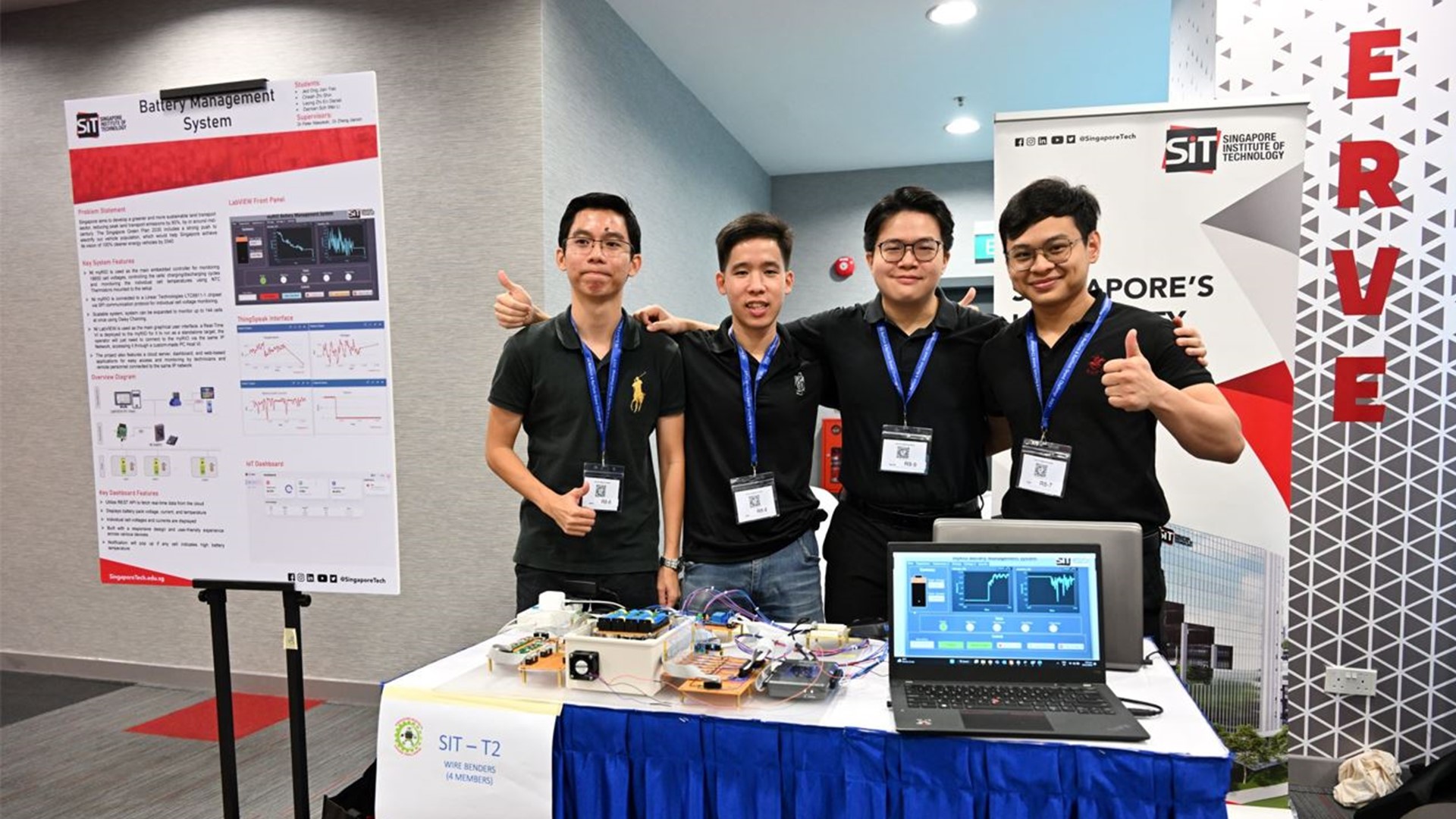
(From left to right:) Jed Ong, Daniel Leong, Damian Soh and Zhi Shin. (Photo: LTA)
Through cloud technology, their BMS allows for remote monitoring, detailed data analysis and system performance evaluation, a must-have in this data-driven era. With real-time monitoring of voltage, current, and temperature of the battery pack, their prototype offers closer monitoring, an enhanced battery lifespan and higher safety protection.
Researching on batteries and designing their BMS was going well – despite several internal disagreements on how to proceed best – until the team realised that their prototype was too costly to make.
“Our original layout for the battery cells would have needed two battery monitoring chips, which are not cheap. To ensure we didn’t blow our budget, we had to innovate a solution and design it from scratch. That was interesting, and we learned a lot from it,” shared Daniel from WireBenders.
“The solution is called daisy chaining, where we connect two charging boards in a way that has not been done by anyone before,” added Damian. Their commendable efforts earned them the second runner-up prize and $1,000.
A Journey to Reflect On and ‘Cell-abrate’
Both Bus-Tastic Daddies and WireBenders said they learned and grew from their competition experience. Besides picking up new technical and programming skills, working on the project honed their abilities in project management, interpersonal communication, public speaking, leadership and conflict resolution. Interacting with the judges also gave them valuable real-world insights, and observing other student entries widened their perspectives on solutions they had not considered before.
“My biggest takeaway was learning to compromise and accommodate each other’s ideas. Running into conflicts with team members is common during our coursework, but there’s more on the line when you’re representing SIT in a competition. The pressure forces you to reflect upon yourself and how you can grow as a person,” reflected Damian.
“Looking back, I’m glad I was unafraid to try. I come from a junior college, have no prior exposure to engineering, and this was my first competition of this nature. You never know how far you can go unless you try,” shared Winardi from Bus-Tastic Daddies.
Added his teammate Daniel, “This competition was fun. Don’t worry about winning or losing, but look forward to the journey and the experience. University shouldn’t be only about memorising textbooks and studying for our modules but also expanding our learning ability.”















![[FA] SIT One SITizen Alumni Initiative_Web banner_1244px x 688px.jpg](/openhouse2025/sit-teaching-and-learning-academy/openhouse/openhouse/sites/default/files/2024-12/%5BFA%5D%20%20SIT%20One%20SITizen%20Alumni%20Initiative_Web%20banner_1244px%20x%20688px.jpg)

